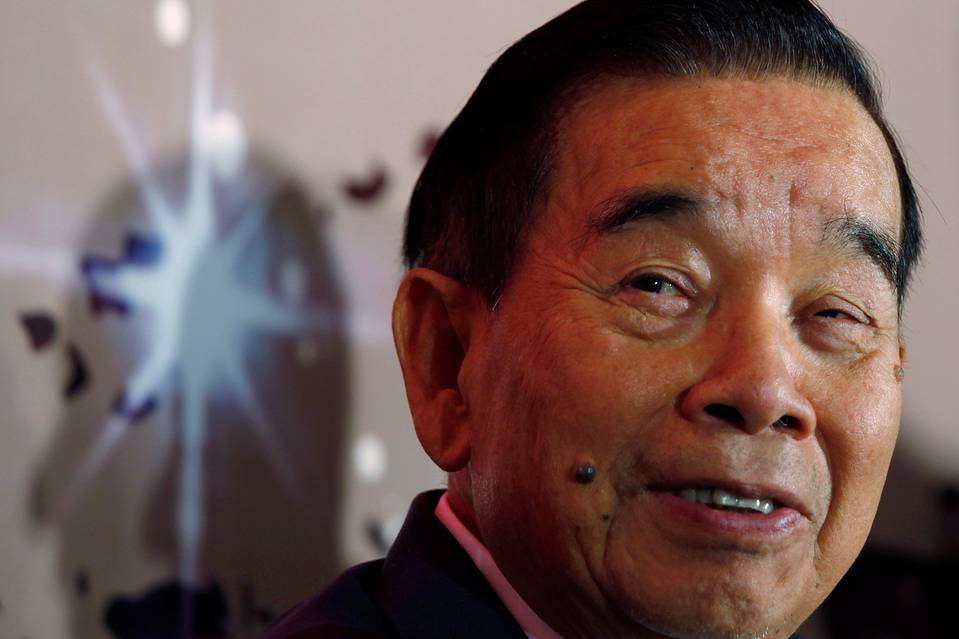
Hong Kong tycoon Cheng Yu-tung, the patriarch behind the Chow Tai Fook jewelry chain and a global real estate empire that includes New York’s Carlyle Hotel, died Thursday. He was 91 years old.
Mr. Cheng “died peacefully” with family by his side, according to a statement from New World Development Co., the conglomerate that he founded. The cause of death wasn’t disclosed.
Mr. Cheng was Hong Kong’s third-richest billionaire, worth an estimated US$16.6 billion,according to Forbes. He controlled a vast business that includes department stores, public buses, ferries and highways in Hong Kong and China though New World Development.
Born in 1925 in rural Guangdong, Mr. Cheng fled to Macau in 1940 by foot, bicycle and boat to escape the advancing Japanese occupation. He was given refuge by a goldsmith who owned the original Chow Tai Fook store in Macau. He eventually married the jeweler’s daughter and moved to Hong Kong in 1946 to establish the company’s first store in the city.
Mr. Cheng’s fortunes rose with Hong Kong’s postwar boom. He pioneered the sale of 24-karat gold jewelry, dubbing it 999.9 to reflect its purity. The product became a hit with Chinese buyers who traditionally bought gold as gifts to mark major life events like births and weddings, and is now an industry standard in the region.
Mr. Cheng started to diversify into real estate in the 1970s, developing apartment buildings and hotels in Hong Kong.
By the 1980s, Mr. Cheng and his son Henry Cheng, who joined his father in the business, were among the first developers to step into China, opening the China Hotel in Guangzhou in 1982, and investing in highway and power plant infrastructure deals through the 1990s.
The elder Mr. Cheng’s real-estate investments spanned the globe: In 1994, he led a group of Hong Kong investors in a $90 million deal with Donald Trump for an apartment complex on Manhattan’s West Side. The group sold the buildings in 2005 for $1.3 billion.
New World Development encountered a cash crunch in the 1990s when investments in China soured. The company was forced to sell assets including the prized Regent Hotel, now the Inter-Continental Hotel, in Hong Kong.
An avid golfer until his later years, Mr. Cheng was known for his down-to-earth personality, often wearing Nike sneakers with his suits and often eating lunch with his employees, many of whom have been with the company for decades, at the simple corporate canteen.
Mr. Cheng’s crown jewel has always been his jewelry business, and its ascent to world player has been relatively recent. The company opened its first store in China in 1998 and now boasts over 1,800 sales outlets in the country.
Chow Tai Fook went public on Dec. 15, 2011, netting Mr. Cheng some $2 billion in proceeds. The initial meeting for prospective investors included many of Hong Kong’s richest businessmen, including Lee Shau Kee of Henderson Land Development Co. and Joseph Lau of Chinese Estates (Holdings) Ltd. Mr. Cheng was known to be friends with many of the other top tycoons of the city of his generation, including Macau gambling magnate Stanley Ho.
In late 2014, Chow Tai Fook and other companies run by Hong Kong tycoons were the target of pro-democracy protests. Students, frustrated by growing inequality and the lack of affordable housing in a real-estate market that is mostly controlled by a handful of Hong Kong families, forced a third of the chain’s jewelry stores to close early at one point during the demonstrations.
Though the shares of the company have been a flop—the stock has fallen 17.7% since it began trading to 5.64 Hong Kong dollars (73 cents) as of Friday’s close—Mr. Cheng and his family insisted that the initial public offering was more about laying out a succession plan.
Henry Cheng now heads New World Development and Chow Tai Fook. Meanwhile, Henry Cheng’s children — son Adrian and daughter Sonia — are running parts of the business.
[Source:-The Wall Street Journal]




